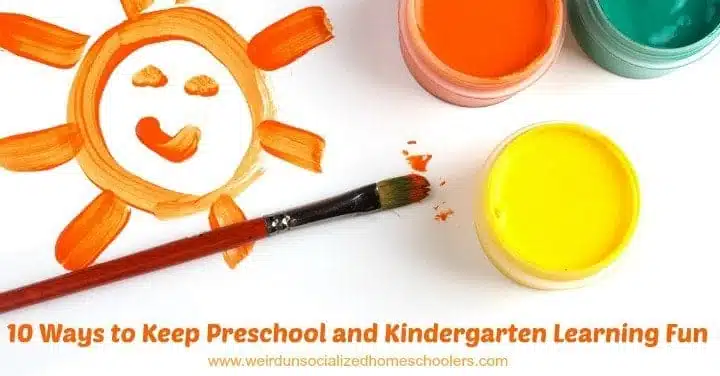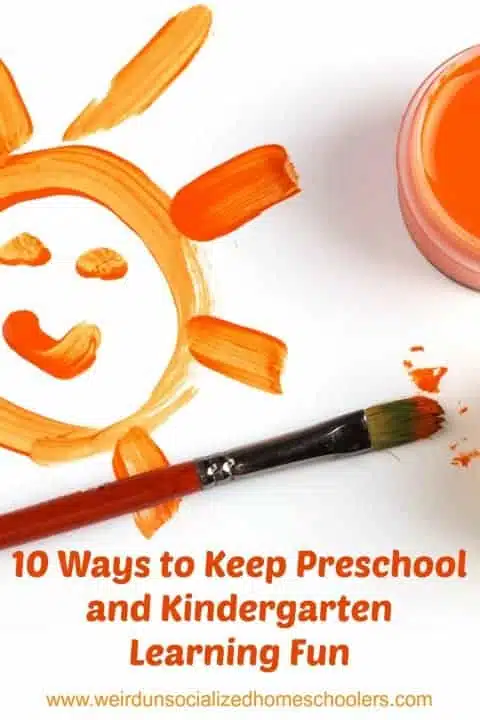10 Ways to Keep Preschool and Kindergarten Learning Fun
It can be so easy as a homeschooling parent – particularly a new one – to get caught up in worrying about academics. Yes, formal learning is important but so is delight-directed learning and just having fun. This is especially true when you have little ones. Moms and dads, keep preschool and kindergarten learning fun!

This post contains affiliate links. See full disclosure policy for more details. Email and RSS feed readers may need to visit the blog to access affiliate links.
Keeping learning fun for your little ones isn’t hard. Just quit worrying about workbooks and curriculum and try these tips.
1. Play!
Don’t underestimate the importance of play for young children. Kids incorporate the things they see and experience into their play. It’s a way of helping them process their experiences and learn valuable social and problem-solving skills.
Play with your child. Reenact everyday situations by playing restaurant or store. Let your child explore his imagination by playing dress-up. (My kids always has a well-stocked dress-up box made up of Halloween costumes purchased on clearance, yard sale and thrift store finds, and outgrown adult or older sibling clothes.)
Let your child lead your play. You don’t need a plan or an ulterior motive. Just spend some time interacting with your youngster and let him lead the fun.
Don’t feel that you always have to play with your child. Let her spend time in self-directed, solitary play or arrange a play date with friends.
2. Follow your child’s lead.
Some young children are ready for some formal learning at an early age – particularly if they have older siblings who are doing school. Play is so important, and parents are often admonished to hold off on formal seatwork. However, if your child enjoys doing more structured learning activities, go for it!
Some kids love to go through preschool or kindergarten workbooks and activity books. Some are eager to learn to read. Capitalize on their eagerness by following their lead – which also means putting the books aside without guilt if the interest wanes.
3. Make your child part of your day.
Young children learn so much simply by participating with you in everyday activities. When you wash dishes, let your child help (or fill up a pan of soapy water and give her her own dishes to wash).
Let him help you sort and fold laundry, which is an excellent way for him to practice categorizing, counting, and fine motor skills. Make your preschooler your official produce-weigher at the grocery store.
Allow your child to help you measure or stir when you cook. This provides a natural way to practice counting and talk about fractions.
4. Go outside.
Any excuse for fresh air and sunshine is a great excuse, but for young children, there is so much to explore outside. This makes time outdoors the perfect learning experience, too. Let your child go outside and just play. Period.
Or, look for simple ways to turn a neighborhood walk into an educational outing. Take a nature walk. Get the Handbook of Nature Study.
You might also want to check out the book, 100 Backyard Activities.
5. Create.
Color. Sculpt with Play-Doh. Cut pictures from old magazines and paste them on construction paper to make collages. All of these activities work on creativity and fine motor skills, but they don’t feel like work. They’re just fun.
I remember one day when my kids were younger (but older than Kindergarten age, so let older siblings in on the fun, too), I pulled out construction paper, old magazines, scissors, and glue. Josh, Megan, and I sat at the table for an hour or more, creating and talking.
It was a little thing, but one of those unexpected memory-makers.
6. Create a learning wall.
When my kids were little, we had a very preschool-classroom-looking learning wall. The kids and I really enjoyed it. (Yes, I include myself.)
It included things like:
- Cute, kid-friendly calendar
- Alphabet
- Days of the week and months of the year
- Shapes and colors
- Letter of the Week activities
The learning wall provided a fun, low-key way for us to take about 15 or 20 minutes to go over key concepts every day.
7. Sing.
Learning songs are great for this age! My kids loved the songs from The Letter Factory. You can sing the alphabet song together as well as songs to help them remember the days of the week, states and capitals, months of the year, skip counting, and more.
And, don’t forget about the Schoolhouse Rock songs! We still sing those.
8. Make homemade toys.
When Brianna was in home daycare, Miss Cheryl had all kinds of fantastic homemade toys that worked on gross and fine motor skills. The kids would drop clothespins in a milk jug or push large pom poms into the jug opening. She always had the sides cut out so the clothespins and pom poms could be easily retrieved.
I used to have an old diaper wipe container filled with caps from various containers such as milk jugs, orange juice containers, and soda bottles. We used them for counters and stacking. The kids would sort them into categories such as same/different, big/little, or by color.

9. Socialize.
Learning to interact with others is an important skill for young children, so don’t feel as though you’re blowing off formal learning when you get out and about in your community.
Go to the library for story time (or just to choose books and talk to the librarians). Head out to the park for play dates – even if you’re not meeting anyone. Kids can have a new best friend within five minutes of arriving at a play place.
10. Read.
Read to your child every day. That is probably one of the most important activities you can do together. Read just for fun. Read random books. Choose a theme for the week. Learn about people from other places. Introduce your child to some of your childhood favorites.
Do some fun extension activities to go along with the books you’re reading, such as Officer Buckle and Gloria or Bread and Jam for Frances. Check out Picture Book Activities by Trish Kuffner for more great ideas.
Preschool and kindergarten are such fun ages! Don’t get bogged down into thinking that every day has to be full of classroom-style learning.
What are some ways you keep (or kept) learning fun for younger kids?
Kris Bales is a newly-retired homeschool mom and the quirky, Christ-following, painfully honest founder (and former owner) of Weird, Unsocialized Homeschoolers. She has a pretty serious addiction to sweet tea and Words with Friends. Kris and her husband of over 30 years are parents to three amazing homeschool grads. They share their home with three dogs, two cats, a ball python, a bearded dragon, and seven birds.



Good reminder, thank you! My seven kids range from 20 down to 5, all homeschooled (two finished), and I have to have my brain in high school, middle school, elementary and kindergarten every day. My kids always have a lot of play time together–maybe too much on those days when I’m all over the place?!–but I don’t always take the time to play with them. I need to be intentional about it, especially my 5-year-old, the only boy! Of course, this is going to mean a lot of running and smiting things, and crashing into/toppling things…oh boy. 😀